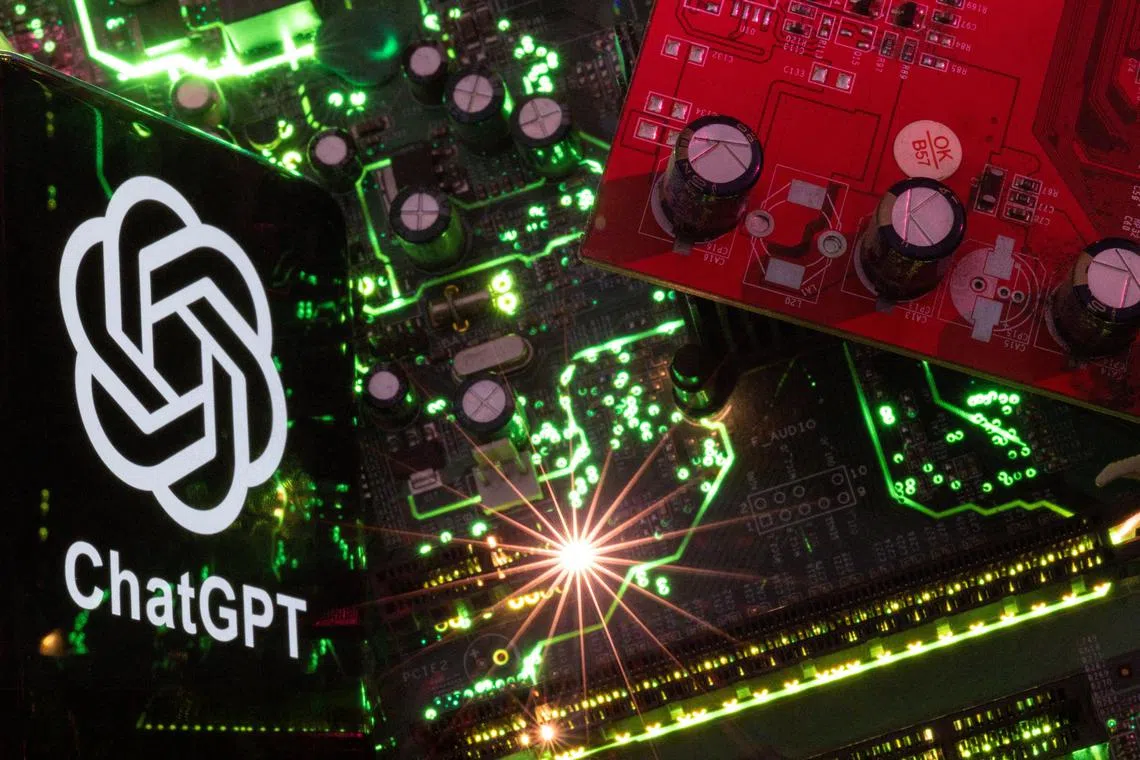OpenAI releases ChatGPT-5 as AI race accelerates
Sign up now: Get ST's newsletters delivered to your inbox

ChatGPT-5 is rolling out free to all users of the AI tool, OpenAI said.
PHOTO: REUTERS
- OpenAI released ChatGPT-5, boasting "significant" AI advancements and wider availability to nearly 700 million weekly users.
- CEO Sam Altman highlights its improved capabilities, especially in "agent" tasks and "vibe-coding," positioning it as a "PhD-level expert."
- Trained for trustworthiness, ChatGPT-5 is designed to provide safe and helpful answers while the US government gains free access to ChatGPT Enterprise.
AI generated
SAN FRANCISCO - OpenAI on Aug 7 released a keenly awaited new generation of its hallmark ChatGPT, touting “significant” advancements in artificial intelligence (AI) capabilities, as a global race over the technology accelerates.
ChatGPT-5 is rolling out free to all users of the AI tool, which is used by nearly 700 million people weekly, OpenAI said in a briefing with journalists.
Co-founder and chief executive Sam Altman touted this latest iteration as “clearly a model that is generally intelligent”.
“It is a significant step toward models that are really capable,” he said.
Mr Altman cautioned that there is still work to be done to achieve the kind of artificial general intelligence (AGI) that thinks the way people do.
“This is not a model that continuously learns as it is deployed from new things it finds, which is something that, to me, feels like it should be part of an AGI,” Mr Altman said.
“But the level of capability here is a huge improvement.”
GPT-5 is particularly adept when it comes to AI acting as an “agent” independently tending to computer tasks, according to Ms Michelle Pokrass, of the development team.
Mr Altman said: “GPT-3 felt to me like talking to a high school student – ask a question, maybe you get a right answer, maybe you’ll get something crazy.
“GPT-4 felt like you’re talking to a college student; GPT-5 is the first time that it really feels like talking to a PhD-level expert in any topic.”
Vibe coding
Mr Altman said he expects the ability to create software programs on demand – so-called “vibe-coding” – to be a “defining part of the new ChatGPT-5 era”.
As an example, OpenAI executives demonstrated the bot being asked to create an app for learning the French language.
With fierce competition around the world over the technology, Mr Altman said ChatGPT-5 led the pack in coding, writing, healthcare and much more.
Rivals including Google and Microsoft have been pumping billions of dollars into developing AI systems.
Mr Altman said there were “orders of magnitude more gains” to come on the path toward AGI.
“Obviously... you have to invest in compute (power) at an eye watering rate to get that, but we intend to keep doing it.”
ChatGPT-5 was also trained to be trustworthy and stick to providing answers as helpful as possible without aiding a seemingly harmful mission, according to OpenAI safety research lead Alex Beutel.
“We built evaluations to measure the prevalence of deception and trained the model to be honest,” Mr Beutel said.
ChatGPT-5 is trained to generate “safe completions”, sticking to high-level information that cannot be used to cause harm, according to Mr Beutel.
The debut comes a day after OpenAI said it was allowing the US government to use a version of ChatGPT designed for businesses for a year for just US$1.
Federal workers in the executive branch will have access to ChatGPT Enterprise essentially free in a partnership with the US General Services Administration, according to the AI sector star.
The company this week also released two new AI models that can be downloaded for free and altered by users, to challenge similar offerings by US and Chinese competition.
The release of gpt-oss-120b and gpt-oss-20b “open-weight language models” comes as the ChatGPT-maker is under pressure to share the inner workings of its software in the spirit of its origin as a nonprofit. AFP


